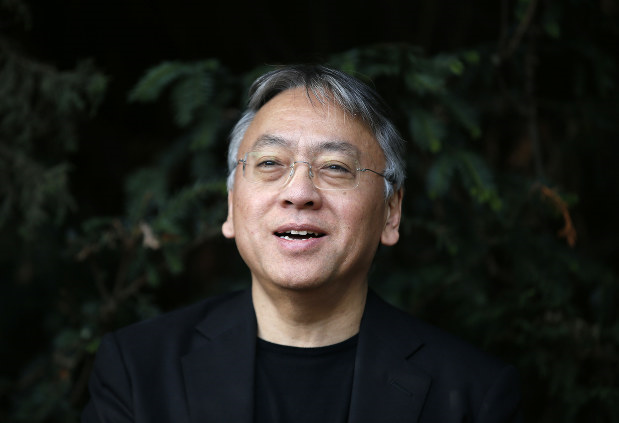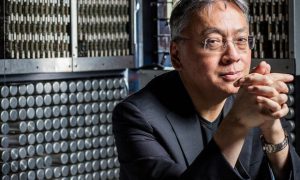海外の作家でこの頃一番読んだ(読んでいる)のは、カズオ・イシグロさん。その人がノーベル文学賞受賞者となった。すばらしい。
読んだのは(途中までのも多いけど);
・遠い山なみの光(1982年) 英・王立文学協会賞 A Pale View of Hills
・日の名残(なご)り(1989年) 英・ブッカー賞 (映画を観ただけ)
・わたしたちが孤児だったころ(2000年) When We were Orphans
・わたしを離さないで(2005年) NEVER LET ME GO
・忘れられた巨人(2015年) A Bruied Giant
ノーベル文学賞にカズオ・イシグロ氏 英国の小説家
下司佳代子=ストックホルム、編集委員・吉村千彰
2017年10月5日20時29分
スウェーデン・アカデミーは5日、2017年のノーベル文学賞を長崎出身の英国の小説家、カズオ・イシグロさん(62)に授与すると発表した。賞金は900万スウェーデンクローナ(約1億2500万円)。授賞式は12月10日にストックホルムである。
発表の瞬間、会場の報道陣から驚きの声が漏れ、拍手が続いた。授賞理由は「人と世界のつながりという幻想の下に口を開けた暗い深淵(しんえん)を、感情豊かにうったえる作品群で暴いてきた」とされた。アカデミーのサラ・ダニウス事務局長は「ジェーン・オースティンとフランツ・カフカをまぜるとカズオ・イシグロになる。そこにマルセル・プルーストを少し加えなければいけない。彼は非常に誠実な作家で、彼自身の美学の宇宙を作り上げた」とたたえた。
“This is a very weird time in the world, we’ve sort of lost faith in our political system, we’ve lost faith in our leaders, we’re not quite sure of our values, and I just hope that my winning the Nobel prize contributes something that engenders good will and peace,” he said. “ It reminds us of how international the world is, and we all have to contribute things from our different corners of the world.
イシグロさんは「受賞は全く予想しておらず、驚いています。折しも今、世界はその価値やリーダーシップ、安全について不確実な時代を迎えています。この大きな受賞が、たとえささやかな形でも、この時代の善意や平和を後押しする力になることを願っています」とコメントを出した。
イシグロさんは1954年、長崎市生まれ。日本名は石黒一雄。5歳の時に海洋学者の父の仕事の都合で一家でイギリスに移住し、83年に英国籍を取得した。
82年の長編デビュー作「遠い山なみの光」で、王立文学協会賞を受賞。続く「浮世の画家」(86年)でも戦後の日本を舞台に、日本人を主人公に描いた。
名を世界に広めたのは、英国で最も権威あるブッカー賞を受けた「日の名残(なご)り」(89年)だ。貴族につかえる執事の人生をつづり、英国を代表する作家になった。映画化され、アカデミー賞8部門にノミネートされた。
カフカ的不条理に放り込まれたピアニストが主人公の「充(み)たされざる者」(95年)、日中戦争下の上海を舞台にしたミステリー仕立ての「わたしたちが孤児だったころ」(00年)と新境地を開拓した。
05年の「わたしを離さないで」は、臓器を提供するためにクローン技術で生まれた若者を主人公にし、大きな反響を呼んだ。「人間の本質とは何かを描きたかった」という。映画・ドラマ・舞台化された。
09年、初の短編集「夜想曲集 音楽と夕暮れをめぐる五つの物語」を発表。音楽家を目指したこともあるイシグロさんが、人生や愛の終わりとかなわぬ夢を描いた。
15年の「忘れられた巨人」は、伝説の英雄アーサー王が死んだ後のイングランドで、竜が吐く霧のせいで記憶を失った老夫婦が旅をする。人種差別や戦争の記憶など、さまざまな記憶を想起させる作品。朝日新聞のインタビューに「夫婦の記憶の話であると同時に社会の記憶の物語でもある」と語った。
昨夏の英国の欧州連合(EU)離脱を決めた国民投票について、英紙に「怒り」を表明。国が分断されるとの危惧を訴えるなど政治的な発言もしていた。(下司佳代子=ストックホルム、編集委員・吉村千彰)
■主な作品
・遠い山なみの光(1982年) 英・王立文学協会賞
・浮世の画家(1986年)
・日の名残(なご)り(1989年) 英・ブッカー賞
・わたしたちが孤児だったころ(2000年)
・わたしを離さないで(2005年)
・忘れられた巨人(2015年)
The Nobel Prize in Literature 2017
Kazuo Ishiguro
Kazuo Ishiguro – Interview
“I come in the line of lots of my greatest heroes. The greatest authors in history have received this Prize.”
Telephone interview with Kazuo Ishiguro after the announcement of the 2017 Nobel Prize in Literature on 5 October 2017. The interviewer is Adam Smith, Chief Scientific Officer of Nobel Media.
Transcript of the interview
Kazuo Ishiguro: Hi, hello, Mr Smith, how are you?
Adam Smith: Very well. Thank you very much indeed for calling, very kind. Congratulations on the award of the Nobel Prize.
KI: Yes, thank you. I’m sorry you were kept hanging on. It’s absolute chaos here I’m afraid. There’s suddenly … a lot of press has turned up and they’re queued up the road.
AS: I can imagine. So, yes, your day must have changed in a totally unexpected way. How did you hear this news?
KI: Well I was sitting in the kitchen writing an email to a friend and the phone rang. And it started off as not entirely certain. People at my literary agents were watching the live feed come through on the announcement. I don’t think they were expecting it, they were just waiting to hear who won the Nobel Prize this year. And so I started to receive calls back to back, and each time we were trying to establish if it was a hoax or if it was fake news, or what it was. And then it started to become more and more certain. By the time the BBC called I started to take it seriously. But I haven’t actually stopped since then. It’s a bit like the Marie Celeste here – everything’s exactly as it was at about 11 o’clock, or whenever, before the whole thing started. And then it was pandemonium. There’s now people queueing up the street to interview me.
AS: So has it sunk in?
KI: No! No, I don’t think it will sink in for a long time. I mean, it’s a ridiculously prestigious honour, in as far as these kinds of things go. I don’t think you would have a more prestigious prize than the Nobel Prize. And comments I would make, I mean, one is, a lot of that prestige must come from the fact that the Swedish Academy has successfully, I think, kept above the fray of partisan politics and so on. And I think it’s remained one of the few things that’s respected, whose integrity is respected by many people around the world, and so I think a lot of the sense of honour of receiving the Prize comes from the actual status of the Swedish Academy. And I think that’s a great achievement unto itself, over all these years the Swedish Academy has managed to retain that high ground, in all the different walks of life that it honours. And then the other reason it’s a terrific honour for me is because … you know I come in a line of lots of my greatest heroes, absolutely great authors. The greatest authors in history have received this Prize, and I have to say, you know, it’s great to come one year after Bob Dylan who was my hero since the age of 13. He’s probably my biggest hero.
AS: That’s nice company to be in.
KI: Yeah. I do a very good Bob Dylan impersonation, but I won’t do it for you right now.
AS: That’s a pity, I would have liked that. Maybe at least when you come to Stockholm in December, please.
KI: Yes, I could try that.
AS: You must. It’s a funny time in Britain at the moment. Does that place any particular significance for you on receiving the Prize now?
KI: I think it does. I mean, in fact just before I picked up the phone to you I was writing a kind of statement for press release, and I was trying to think what could I say in three lines, and I think the timing is pertinent for me because I feel … I’m nearly 63 years old, I can’t remember a time when we were so uncertain about our values in the western world. You know, I think we are going through a time of great uncertainty about our values, about our leadership. People don’t feel safe. So I do hope that things like the Nobel Prize will in some way contribute to the positive things in the world, to the decent values in the world, and that it would contribute to some sense of continuity and decency. Yeah.
AS: I suppose what you have been writing about all this time, in a way, is that question of our place in the world, our connection to each other, our connection with the world. That is perhaps the theme you explore the most, do you think?
KI: Yes, I would say so, I mean I think … If I could put it a little bit more narrowly that that, I mean it’s probably … one of the things that’s interested me always is how we live in small worlds and big worlds at the same time, that we have a personal arena in which we have to try and find fulfilment and love. But that inevitably intersects with a larger world, where politics, or even dystopian universes, can prevail. So I think I’ve always been interested in that. We live in small worlds and big worlds at the same time and we can’t, you know, forget one or the other.
AS: Thank you, well, these are things to talk about on a different day I guess.
KI: Yes.
AS: For the moment you have to work out how you’re going to handle this line of press. Just a last thought – how do you feel about the deluge of attention you’re about to receive?
KI: Well, I think … I take it very positively. I mean, while it’s a little unsettling because I had no idea when I woke up this morning that it was going to be anything other than a very ordinary day, I think it’s a great thing that the press, the media, take the Nobel Prize for Literature seriously. I’ll be very alarmed if there was a day when somebody won the Nobel Prize for Literature and nobody was interested. That would suggest that some awful things had happened to the world.
AS: A day to celebrate literature has to be a good day.
KI: Yes, and I think literature can be a great thing, it can be sometimes a force for bad as well. You know I think things like the Nobel Prize for Literature exist to try and ensure that it is a force for good.
AS: Lovely. Well thank you very much indeed, and we very much look forward to welcoming you to Stockholm in December.
KI: Yeah, really looking forward to it. Well, very nice to talk to you Mr Smith.
AS: Thank you very much indeed.
KI: Take care now. Bye.
MLA style: “Kazuo Ishiguro – Interview”. Nobelprize.org. Nobel Media AB 2014. Web. 7 Oct 2017. <http://www.nobelprize.org/nobel_prizes/literature/laureates/2017/ishiguro-interview.html>
http://www.akemimarumo.com/2017/12/kazuo-ishiguro-his-speech-in-stockholm-2/


